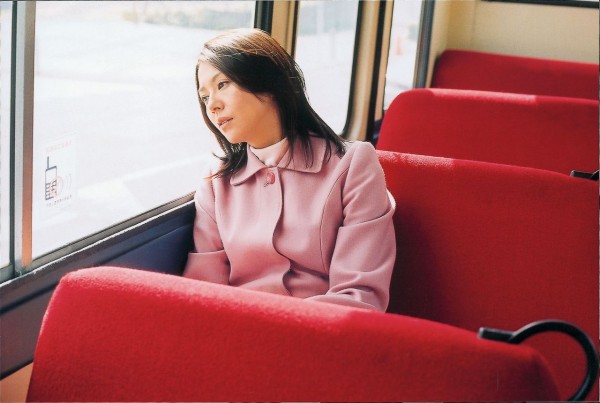 ANNE SUZUKI IN HANGING GARDEN
ANNE SUZUKI IN HANGING GARDENFROM NYAFF: A special 20th anniversary screening of NYAFF 2025 Filmmaker in Focus Toshiaki Toyoda’s unnerving 2005 portrait of one family’s secrets, the film that launched a Japanese genre. - Festival blurb.
TOSHIAKI TOYODA: HANGING GARDEN 空中庭園 (2005) New York Asian Film Festival 2025Toyoda's provocative portrait of an urban family, everyone going their own wayBefore Kiyoshi Kurosawa’s
Tokyo Sonata, Kore-eda’s
Still Walking, and Sion Sono’s
Noriko’s Dinner Table, it has been said, there was Toshiaki Toyoda’s
Hanging Garden, the film that "started it all." (But compare also the crooked famly genre, represented by Bong Joon-ho's
Parasite and Hirakasu Koreeda's
Shoplifters.)
The Hangong Garden (the title refers to the mother's beautiful balcany garden attached to the Kobayashi family's small, but nice, housing project apartment) certainly is worth a watch. It was also a change of pace for director Toshiaki Toyoda, being celebrated in this year's New York Asian Film Festival. It's more satirical and comical than the other listed family films. And for earlier cinematic dives into the Japanese famly we must consider, and bow to, the classic work of Yasujirō Ozu, whose work is on another level, as significant artistically as it is culturally.
A refreshing change of pace into bluntness and satire came in 1983, with Yoshimitsu Morita's generationally defining
The Familly Game, an acid depiction of gender power lines and the way small middle class Japanese families really worked.
All these post-Ozu movies are different in style, focus and quality; they just all involve modern day urban Japanese families. Some of them, like Ozu, try to deal with subtle fluctuations in famiily as
Still Walking does-
Hanging Garden certainly does
not do that. They all tend to shrink in significance when we compare them with the Ozu classics. But if you want to say a family is not what it seems on the surface or what its members tell each other, this is a general theme linking numerous films. (This may flow naturally out of Japanese culture's enigmatic and concealing aspect, its emphasis on shame, respect,and image.)
The Japan Society description of
Hanging Garden for its 2010 presentation was "Family as a nightmare and a fount of terror, discord and disquiet: that was his [Toyoda's] idea." This quality may be most hilighted not by any one subplot but by the ever-present swirling, rocking movements of the camera of dp Kenji Maki . The Japan Society blurb goes on to describe the family members one by one. First the mother, Eriko (Kyoko Koizumi), "cheerful and subservient on the surface but full of murderous rage and dying inside." Next the father, salaryman Takashi (Itsuji Itao), "a bland corporate drone driven by the dark forces below his belt." (We learn that Eriko chose him and seduced him.) Then the children, "the sulky and socially withdrawn son Ko (Masahiro Hirota), not much of an A-student in public but more studious with his private tutor when the door’s closed" (and often off to a love hotel). And teenage daughter Mana (Anne Suzuki), "an obsessive visitor and user of love hotels in a bizarre, frantic search for the origin of her own conception." Finally there is the "rather wicked chain-smoking grandmother…," the blurb concludes. She is Sacchan, Satoko Kinosaki (Michiyo Yasuda).
The film is somewhat a series of skits, linked by the fact the central character in each is a member of the Koyahashi family and may have to deceive other family members to do what he or she does independently. Even the grandma winds up in the love hotel at one point, though she (in an example of premature dementia?) cares nothing for the impression she makes.
Some of the provocative effects like that may titillate, at the cost of any feel of authenticity. Toyoda is a little too much in love with filming the love hotel.
Hanging Garden may have been a ground-breaker, but it's not best in class. It's probably another example of Toyoda's variety, about which I can't say much yet, having only seen
Transcending Dimensions, a more impressive film than this one.
9 Souls is pending.
Hanging Garden 空中庭園 ("Hanging Gardens"), 114 mins., opened in Tokyo Oct. 8, 2005; limited festival showings began with Sarajevo Aug. 23, 2006. Screened for this review as part of selected Fimmaker in Focus review of Toyoda's past and present work in the New York Asian Film Festival, Jul. 11-27, 2025.
Showtimes:
Fri, July 18
3:00 PM




